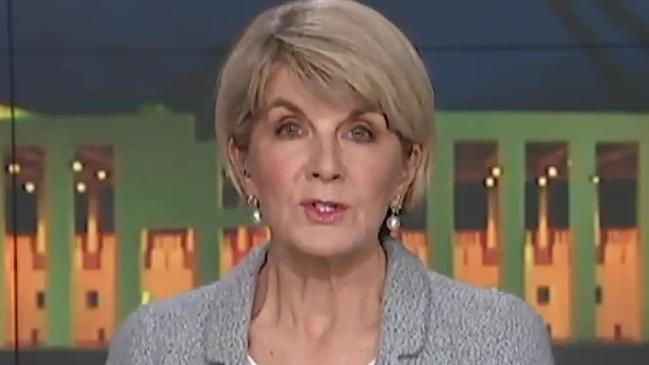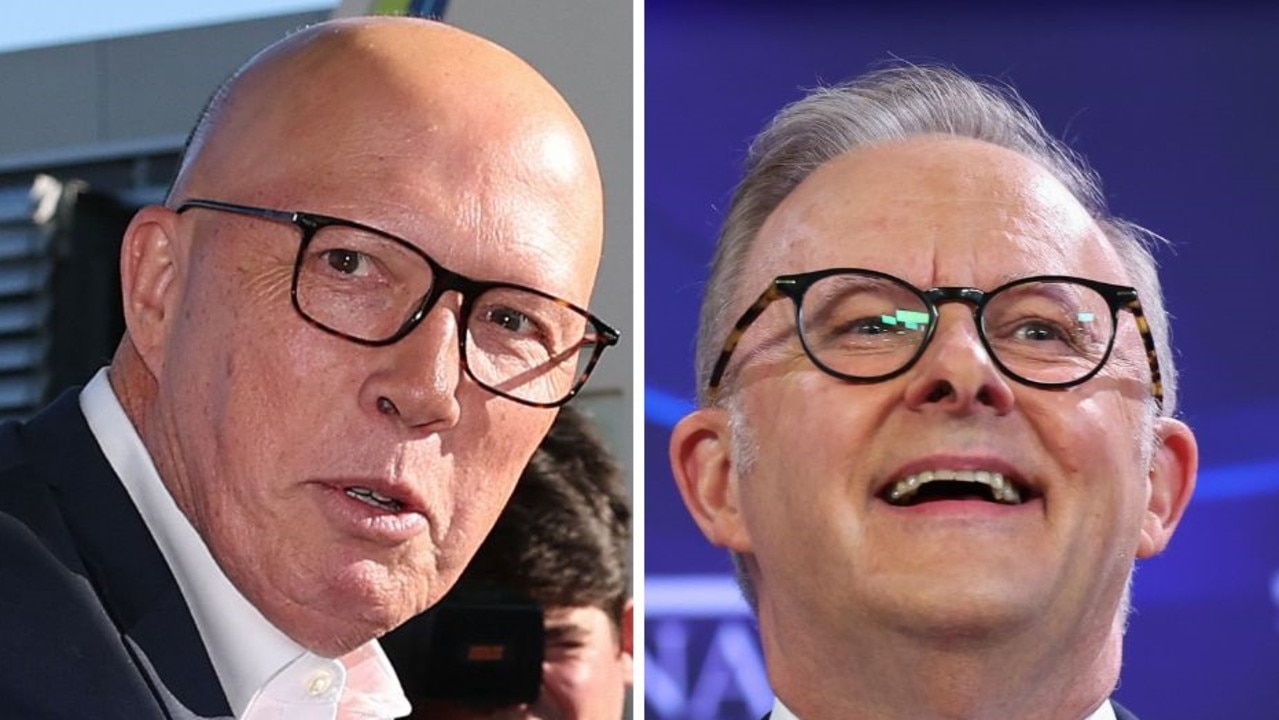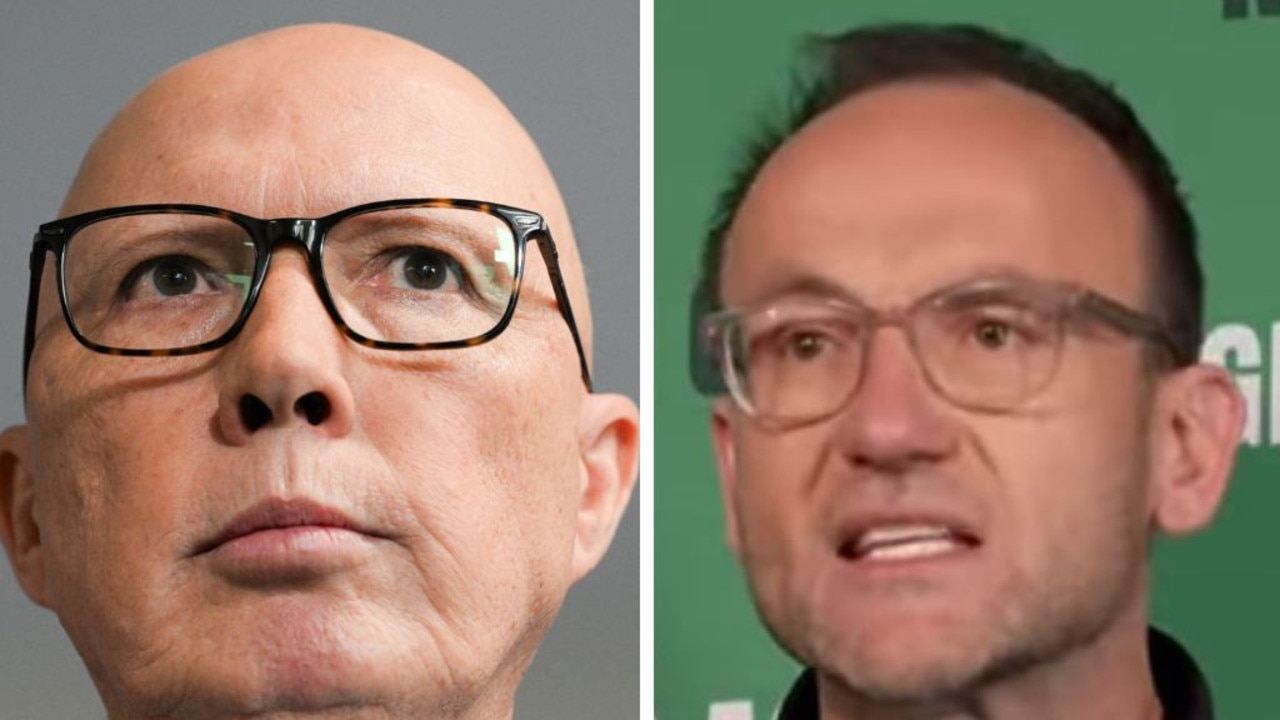Why is Julie Bishop overlooked as a potential prime minister?
SHE’S more popular, better qualified and could actually help the Coalition win the next election — so why isn’t the party turning to Julie Bishop?

IN THE game of chess, the bishop is a powerful figure.
It has not the power of the queen, but its ability to surprise, at a distance, with diagonal moves across the board, means it’s a threat to the king that he may not see coming.
It’s a cheap analogy, but there’s some truth to it. There’s a bishop on the chess board of Australian politics, and people are wondering why it doesn’t strike.
Deputy Liberal leader and Foreign Minister Julie Bishop has quietly and doggedly remained a deputy to Tony Abbott and Malcolm Turnbull. She’s been deputy leader of the party for 11 years, as far back, in fact, as the leadership of Brendan Nelson.
On ABC’s 7.30 last night, she called for stability, defended Malcolm Turnbull’s leadership, and when pressed on whether she’d run if there was a second ballot she said, “I’m not canvassing that option.” She repeated her position on Sunrise and Today this morning.
While she, at least publicly, may not be canvassing the idea of running the Liberal Party, many voters are. They’re asking, why not Julie Bishop?
If the Liberal Party is going to go through all the upheaval and transactional costs of changing its leader, you’d think the party ought to elect as that leader, the person with the greatest chance of electoral success.
Ask yourself, who’d have a better chance of beating Bill Shorten. Peter Dutton or Julie Bishop?
You don’t even have to ask yourself because the polls, over a long period, answer the question.
In an Essential Poll earlier this year, Julie Bishop only just trailed Malcolm Turnbull as preferred leader. Just 3 per cent of respondents thought Peter Dutton was the man for the job.
A Newspoll late last year had Julie Bishop ahead of Turnbull as Liberal leader. She was on 40 per cent, Turnbull on 27 per cent and Dutton, well he was on just 11 per cent.
And only yesterday in a poll of News Corp readers, asking who is the preferred leader, Turnbull (32 per cent) was just ahead of Bishop (30 per cent). But she was streets ahead of Dutton (12 per cent).
In a contest between Bishop and Dutton, daylight separates the two.
Julie Bishop has the runs on the board and has had a long apprenticeship for the job. No, she won’t appeal to the conservative right of the Liberal Party, but she is likely to appeal to swinging voters in the centre. You know, those people out in marginal electorates, who work hard, pay their bills and who actually decide who wins an election.
MORE: Laughing stock: Damning proof our democracy is dead
MORE: More ministers resign from cabinet
MORE: Even if Dutton wins, he loses
Her elevation as the party’s first female leader might also help convince some of those voters that the Liberal Party is not the boys’ club that many consider it to be.
Julie Bishop is well known. She has personality. She’s tough and strident. She has razor-sharp humour. She’s relatable.
Most importantly though, she’s stable. She’s been in the same job as deputy leader in the party since 2007. She’s been Minister for Women, for Ageing, for Education and Science, and even acting prime minister. She’s been in parliament for 20 years. She’s represented Australia on the world stage as Foreign Minister.
Frankly, this could be her moment, if she wanted it to be. Her opportunity for elevation though would require one of two things: either Malcolm Turnbull resigns and there is a genuine contest over leadership, or she reneges on her word and has a crack at a ballot.
To do the latter and become an assassin would give her the reputation that has dogged every leader for the past 10 years.
The signs at the moment though are that the Prime Minister is unlikely to resign and until now Bishop has been true to her word, and been loyal to him.
Even if she had a go, the path to the leadership wouldn’t be easy for her.
Her first problem is that she is a moderate, like Turnbull. She’s been progressive on issues like the republic, same-sex marriage and women’s health. Those pressing for change in the party want someone further to the right, someone more conservative. For them, if they’re going to have Bishop, they might as well have Turnbull.
Secondly, she faces an unfair battle that many women in politics have faced: sexism. Women make up just 22 per cent of Liberals in federal Parliament and are well outnumbered in the ministry. We’ve had only one female prime minister and she faced attacks that a man in the same position would never have experienced. In this regard, Bishop faces an unequal, unfair and uphill battle.
Thirdly, inside the party, although she has been deputy leader, her loyalty has been questioned by colleagues. Those agitating for change, have a critical memory of her role in the coup that saw Abbott unseated by Turnbull in 2015, saying she didn’t do enough to protect Abbott at the time.
And finally, coming from Western Australia doesn’t make things easy for her. Both parties know that the marginal seats that need to be won are on the other side of the country.
But to win those marginal seats, if Peter Dutton were leader, he’d need to reshape his persona, and fast. No one even knows if he is capable of that. He’s an unknown quality, a gamble.
On the other hand, in campaign mode, Julie Bishop could hit the ground running. We know who she is and what she stands for. Unlike Dutton, she wouldn’t need to waste any time.
Julie Bishop is a better communicator than Malcolm Turnbull. His failings have been, not just capitulation on policy, but an inability to communicate those policies well to the people. On this, Bishop could be different. He’s also not a natural politician, but after twenty years in Canberra, she is.
It was reported yesterday that Julie Bishop would quit politics if Dutton became PM. She’s denied this, but if it were to happen, it would be a shame. The party could lose not only a great asset, but an opportunity for a strong and popular leader.
For the bishop to strike, her own king would have to make way.
But for now he won’t. And she says she won’t either. Perhaps it’s because Julie Bishop is being loyal and pragmatic. Ironically, two qualities that would be admirable in a prime minister.
Chris Urquhart is a freelance journalist. Follow him on Twitter: @chrisurquhart



